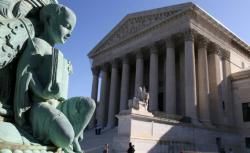Read all of Slate’s coverage about the Affordable Care Act.
One thing was clear after the two hour session at the Supreme Court on the constitutionality of the Affordable Care Act: The outcome of President Obama’s signature legislative achievement probably rests on the shoulders of two men—Chief Justice John Roberts and Justice Anthony Kennedy. Or, to put it differently, everyone else seems to have staked a clear position. The court’s four liberals appear poised to uphold the law. Justices Samuel Alito and Antonin Scalia appear ready to strike it down. Justice Clarence Thomas was always assumed to be a vote against the Affordable Care Act and didn’t speak today. So, we are left to guess about Chief Justice Roberts and Justice Kennedy, who based on their questions appear to be someplace in the middle. The betting on the steps of the court afterward split among those who suspected the final vote will be 5-4 to strike it down, or 6-3 to uphold it. I didn’t hear anyone taking bets on anything in between.
In the beginning, all eyes were on Kennedy who opened his questioning by asking Solicitor General Donald Verrilli to “assume this law is unprecedented.” (Gulp. That isn’t the way Verrilli wanted this to begin.) Both Kennedy and Roberts pressed Verrilli to enunciate a limiting principle on the congressional power asserted here. Or as Kennedy put it, early in the argument: “Can you identify any limits on the commerce clause?” And Roberts was also bothered by the degree to which invoking the commerce clause to regulate the insurance market would mean that “all bets are off” (he said that phrase twice) and anything could be subject to regulation. When Kennedy said that “the reason this is concerning, is because it requires the individual to do an affirmative act,” it appeared that he was willing to accept the argument presented by the Obama administration’s opponents that the critical distinction in the case is between regulating activity and regulating “inactivity.”
When Paul Clement rose on behalf of the 26 states challenging the mandate, to many in the gallery it looked like it was all over. Kennedy had serious doubts and Verrilli appeared unable to allay them. The odds on a 5-4 vote to strike down the law looked good. Kennedy asked far fewer questions of the challengers, although near the end of the morning he said, in his inimitably oblique style that young people are “uniquely, proximately very close to affecting the rates of insurance and the cost of providing medical care in a way that is not true in other industries.” That may suggest he believes that the health insurance market really is unique in some ways. Roberts also challenged Paul Clement and Michael Carvin, who spoke in opposition to the law, a number of times. But the Chief Justice’s questions were often framed as “The government says …,” which suggests to at least some court-watchers that he was channeling arguments rather than making them.
Afterward, everyone milled around on the plaza, ducking between the tri-corner hats and the pink banners, and trying to tease out what had happened in there. My sense is that we saw only a part of what the justices were really thinking today. We heard Roberts and Kennedy expressing doubts about each side of the argument. But we didn’t get to hear them think aloud about what it actually means to strike down a monumental act of congress. We can assume that is weighing on some of the justices, nonetheless. The other thing we didn’t hear much about today was case law. Justice Stephen Breyer pointed out more than once that the justices weren’t there to debate whether or not they liked the bill. But it may be worth counting up the references to forced gym memberships, cellphone purchases, and broccoli mandates, and tallying them up against references to actual court cases. That’s either because the mandate is so unprecedented that precedent doesn’t matter. Or, because precedent just doesn’t matter.
Dahlia Lithwick will be chatting with readers on Facebook about this week’s Obamacare oral arguments at 11:00 a.m. EST on Thursday, March 29.
Dahlia Lithwick on Day Two of the Health Care Arguments at the Supreme Court:
